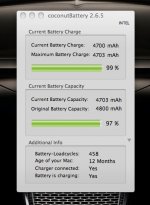I was as sparky (electrician) for the better part of 20yrs, working for many years in electrical and electronic repairs.... as for my facts, I have researched extensively the technology, if you even just google a little, you will find bucket loads of info that will back up what I have stated.
We're way past the days of the NIMH batteries, etc and over charging, unless you are talking about rechargeable shavers and so forth.
It appears my charging methods are working a charm....
See 95% at 338 cycles over 29months ;P

Edit:
Summary of sourced info for you

.....
The memory effect, or the need to deep-cycle the battery by completely discharging before recharging, is stale knowledge from the time of NiCad and NiMH batteries. Lithium-ion batteries don’t suffer from the memory effect.
It’s also not bad to leave your laptop plugged in. In fact, it’s a good thing to keep it plugged in whenever you don’t need to be running on battery power.
Apple recommends that you run it on battery for a while at least once per month. It’s pretty difficult to own a laptop and not do this, but it is an edge case that some people achieve.
You shouldn’t technically leave your laptop plugged in all the time, but you certainly don’t need to deep-cycle it a few times a week.
The recommendation for monthly battery usage isn’t just for capacity preservation, it’s mostly so the charge indicator can maintain accuracy as the battery’s capacity decreases naturally over its lifespan.
Due to their chemistry, lithium-ion batteries capacity slowly diminishes with age. Laptop batteries usually lose most of their useful capacity 2-3 years after manufacture (not initial use).
The new lithium-polymer batteries claim to have improved this, but it’s too early to tell if these claims have merit.
If you use the laptop on battery power a lot, the battery lifespan will be shortened. This “wearing out” effect is much less severe than with older battery technologies, but is still present. This is why you should plug it in if it’s convenient.
When plugged in, the battery is not in use. The laptop’s power circuitry bypasses the battery unless it’s needed. Depending on how smart the charger is, it may occasionally poll and “top off” the battery if its charge decreases to a certain threshold below 100%, but this is rarely needed in practice.
If the battery is not in use, it will slowly lose its charge due to all rechargeable batteries’ tendency to slowly self-discharge. Lithium-ion and lithium-polymer batteries have the lowest self-discharge rates of any common battery technology, estimated at less than 1% per month and difficult to distinguish from the loss of capacity with age.
In reality, if your laptop is closed, the battery slowly discharges with time because it’s not really “off”. A small amount of continuous power is needed to preserve the RAM’s state during sleep. It’s not the battery wearing out — it’s being used, but much more slowly than when the computer’s in use.






